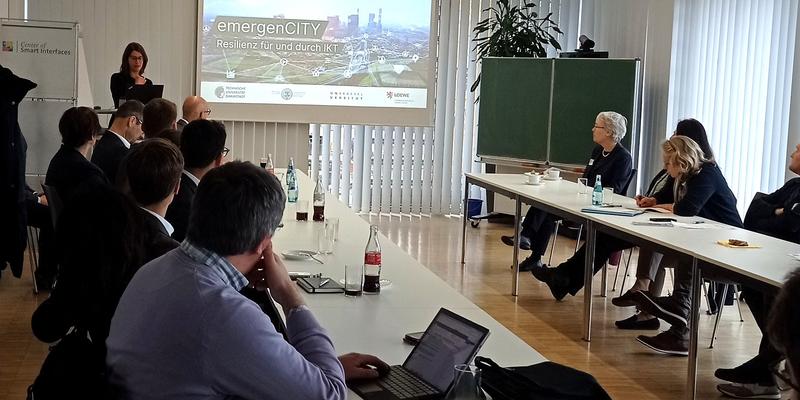Science Meets Regions with emergenCITY
The practice day of the EU-funded project enables guests from politics and administration to gain insight into current research fields of the participating universities – including emergenCITY’s research.
The practice day of the EU-funded project enables guests from politics and administration to gain insight into current research fields of the participating universities – including emergenCITY’s research.

On March 30, representatives from Hessian and Rhineland-Palatinate state institutions and city administrations and other organizations visited TU Darmstadt. Keynote speeches by Dr. Anne Hofmeister, Professor Florian Steinke and Borys Ioshchikhes provided an overview of current research issues in the topics of resilient digital cities, energy efficiency through smart system networking, and energy technologies and application in production.
After the presentations, the 25 guests from politics and administration were then able to experience the applications live in practice. For example, the guests learned about technical solutions for the self-sufficient emergency operation of photovoltaic systems in the event of a crisis in emergenCITY’s energy-autonomous eHUB. After the tours, the practical day was rounded off by the event “E+E Discourse: Energy Systems of the Future - So that we don’t run out of light”, which was hosted by the Energy+Environment research field of the TU Darmstadt in the Georg-Christoph-Lichtenberg-Haus.
Professor Florian Steinke was very positive about the event: “As scientists, we can provide important impetus for dealing with the major challenges in the fields of environment, energy and digitalization. To do this, we need opportunities for exchange with practitioners. Today was therefore very important so that representatives from practice could experience our research in person and know that they can approach us with questions in the future.”
The event was funded by the European Commission’s Science meets Regions program and organized in cooperation with the Mercator Science-Policy Fellowship program of the Rhine-Main universities, the Energy+Environment research field, and the LOEWE emergenCITY center.
Tome Sandevski, ska